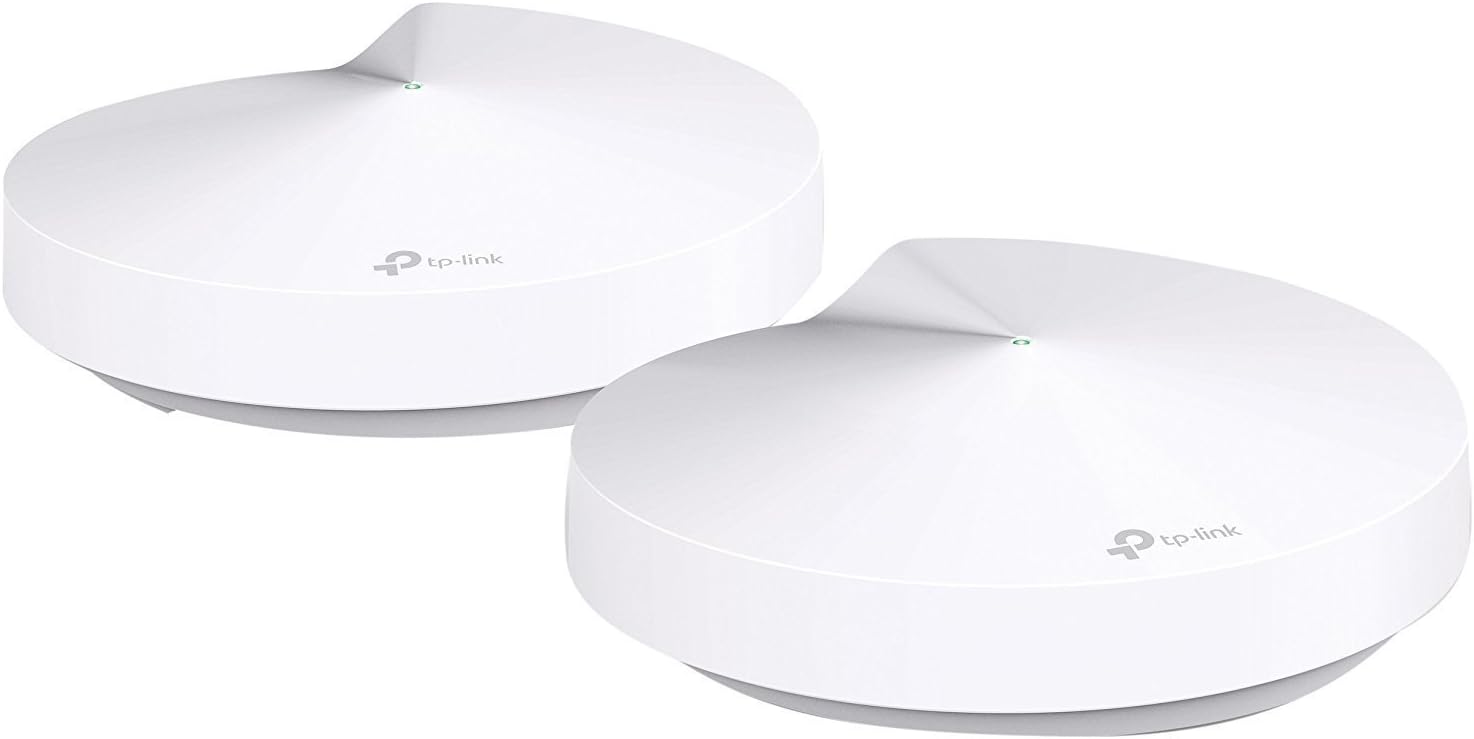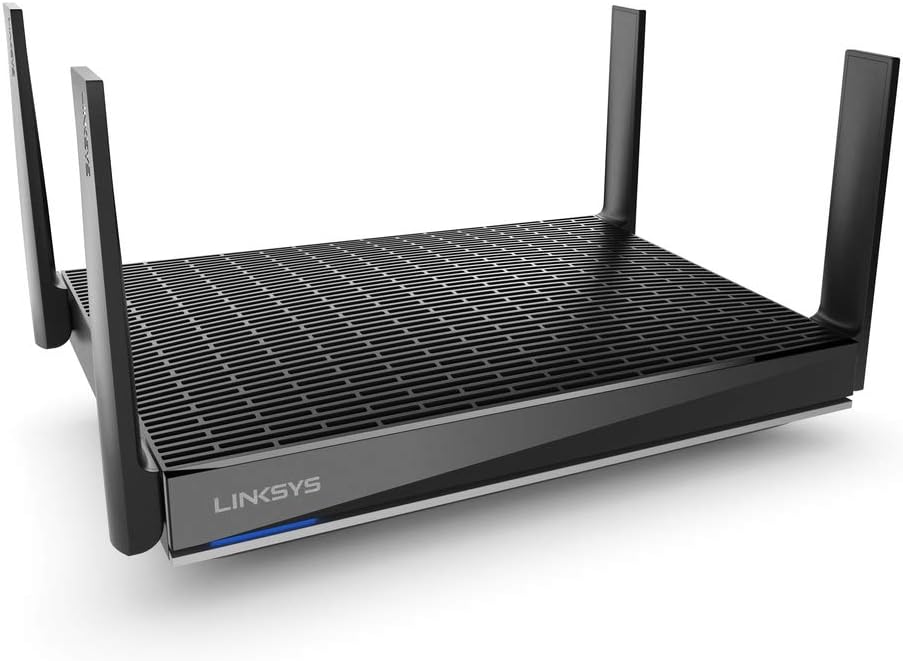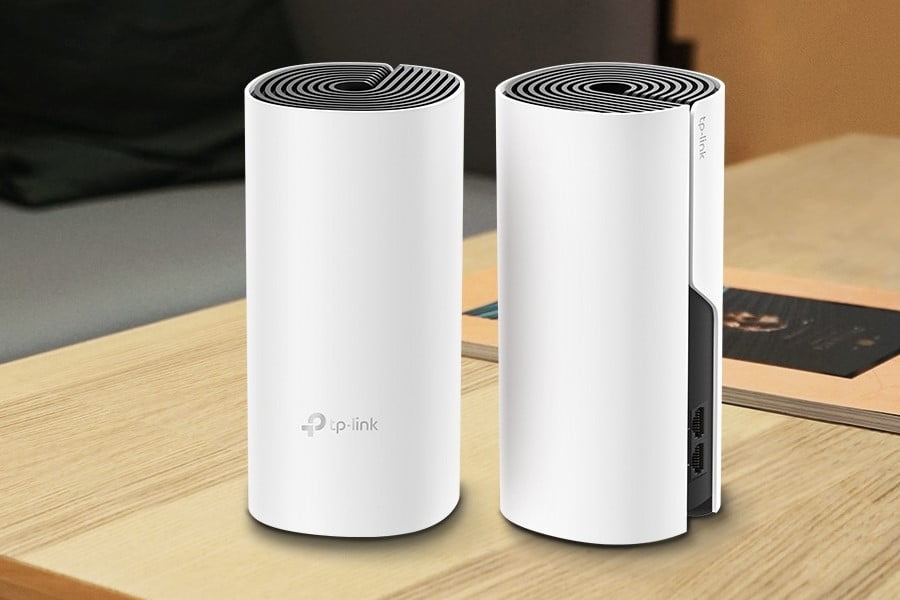Your Wi-Fi experience will be significantly improved if you switch to one of the latest mesh Wi-Fi systems, which can cover the largest of homes with speedy Wi-Fi. If you’re looking to cover a broad area with Wi-Fi, a mesh router is the best method to do so, eliminating dead spots even in the most remote areas of your home.
A mesh router can achieve what a standalone router can’t, delivering a strong Wi-Fi signal to every section of your home, no matter how many floors you have or how many brick walls you have.
Top 10 Best Mesh WiFi Reviews
With even the most basic mesh system, you can get improved Wi-Fi coverage no matter where you are or how far away you are. From wireless-AC mesh routers to the top Wi-Fi 6 mesh systems on the market, we’ve tested and reviewed the most popular brands to help you pick the best mesh system for your house.
Google Nest Wifi – AC2200 – Mesh WiFi System

Google’s Nest WiFi is the greatest mesh Wi-Fi solution currently available. Wi-Fi coverage may be expanded to cover everything from a tiny house to a huge estate with this device’s excellent performance and ease of installation.
The Nest WiFi, on the other hand, includes a Google Home smart speaker in every mesh extension, unlike any other mesh kit. All of your connected devices in your home can be controlled by voice commands with these little routers, which are compatible with Amazon’s Alexa and Google Assistant.
Adding more Google Home modules to your Nest system allows you to have a voice assistant in every area of your home. It’s also possible to enhance mesh coverage by using an outdated Google WiFi setup that’s been lying around collecting dust. In the case of a residential WiFi mesh network, this is the best and most straightforward option.
Pros
- Excellent performance
- Google Assistant built-in
- Easy setup
Cons
- Short-range
- Minimal configuration options
NETGEAR Orbi Whole Home Tri-band Mesh WiFi 6 System

Our long-awaited Netgear Orbi WiFi 6 (RBK852) is finally here, combining the best of Netgear’s mesh Wi-Fi solution with the speed and future-proofing of Wi-Fi 6. The Orbi model line is known for its simple setup and excellent performance, and the latest model doesn’t disappoint.
To top it all off, the fast and reliable Wi-Fi and built-in security of the RBK852 make it a top pick for homes looking for the best Wi-Fi performance in their price range.
When it comes to mesh networking, the Netgear Orbi WiFi 6 (RBK852) is a fantastic choice, especially for individuals who live in older homes with many walls. The Netgear Orbi WiFi 6 (RBK852) is the best mesh Wi-Fi 6 device.
Pros
- Top Wi-Fi 6 mesh performance
- Malware protection
- Excellent wall and ceiling penetration
Cons
- Very expensive
- Large
TP-Link Deco WiFi 6 Mesh System

Deco X20 mesh networking kit is a cheap pleasure that can help fill a home with Wi-Fi 6 data and protect a family’s identities with an additional layer of online security. Wi-Fi 6 and mesh networking are the greatest economical options for covering larger households with more speed and capacity than earlier 802.11ac systems can offer. Up to 5,800 square feet of coverage and 150 connected devices are possible with the Deco X20, which is available in sets of three.
The Deco X20’s dual-band connectivity and two-gigabit cable connections on each node make it easy to set up and maintain the network. As part of its Deco app, TP-Link provides all the tools you need to rapidly set up your network and operate the network’s various capabilities through graphical, easy-to-understand menus. TP-Link HomeCare security and antivirus are also included in the package, which includes WPA3 encryption and a lifetime subscription to TP-Link HomeCare.
Pros
- Small router and satellites
- Inexpensive
- Excellent range
- Extra security
Cons
- No dedicated backchannel for data
- Lack of customization options
Linksys AX4200 Smart Mesh Wi-Fi 6 Router

This mesh kit from Linksys offers tri-band Wi-Fi 6 that can cover a large house in Wi-Fi signal without the exorbitant prices of many Wi-Fi 6 mesh systems, the Linksys Velop AX4200. We named it the best mesh router because of that.
The three-pack we tested can cover 8,000 square feet and is easily expandable with additional units, making this mesh system an excellent value. If you’re looking for something with USB connectivity, you’ll be happy to know it’s there.
Nevertheless, it isn’t the quickest mesh kit on the market, falling behind more expensive rivals and lacking in additional security and customization features. If you’re looking for an inexpensive way to set up a large Wi-Fi network in your home, the three-pack Linksys Velop AX4200 is an excellent option.
Pros
- Inexpensive mesh kit
- Good throughput with the dynamic tri-band operation
- Three-year warranty
Cons
- No security software
- Slow setup
Amazon eero Pro 6 tri-band mesh Wi-Fi

The Eero Pro 6 is the greatest mesh system we’ve tested because it combines tri-band Wi-Fi 6 networking with a setup that’s faster and easier than any other mesh system we’ve tested. The three-pack Eero Pro 6 can cover up to 6,000 square feet easily, and we were able to set it up in just 11 minutes.
The Eero Pro 6 mesh kit may not have the fastest throughput, but it performs well at mid-range distances where other mesh systems falter, is easy to set up, and automatically adjusts just about every aspect.
Capabilities such as band steering, local DNS caching, and home automation tools are available if you desire more granular control. As a result, the Eero Pro 6 is the greatest Wi-Fi 6 router if you don’t mind setting it up and forgetting about it.
Pros
- Great range
- Dynamic tri-band operation
- Easy fast setup
Cons
- Devices have only two Ethernet ports
- Moderate throughput close up
- No USB ports
NETGEAR Orbi Whole Home Tri-band Mesh WiFi 6 System

There’s no better Wi-Fi 6 mesh system out there than the highly-rated Netgear Orbi RBK852 if you’re on a budget. There are fewer antennae and less powerful processors in the Orbi RBK752 than there are in the more expensive Orbi RBK751. This results in lower throughput and range. With that in mind, you’ll want to upgrade to the 3- or 4-packs for bigger regions of coverage. Packages may be more expensive than individual satellites, but they are more cost-effective in the long run.
If you’re on a tight budget, the Wi-Fi 6 Orbi is a great way to obtain Netgear’s superb mesh networking hardware and respectable speeds across your home without having to shell out for the more expensive Wi-Fi 6 Orbi, which doesn’t put as much focus on raw performance.
Pros
- Malware protection
- Tri-band operation
- Easy setup
Cons
- Large–90-day support policy
- Short-range
ASUS ZenWiFi AX6600 Tri-Band Mesh WiFi 6

Mesh networking with the Asus ZenWiFi AX (XT8) is perfect for any mid-range home, thanks to its easy-to-use design and Wi-Fi 6 support. The Asus ZenWiFi AX, with its Wi-Fi 6 capability and tri-band design, can fill a medium-sized home with wireless data. A family network “administrator” may rest easy knowing their data is safe with the ZenWiFi AX, even if it isn’t the fastest mesh kit around.
Neither are there any antennas or flashing lights to detract from the elegant appearance. A bookend-like form and a size that makes competing mesh systems look downright bulky are the ZenWiFi’s main selling points. The ZenWiFi’s mesh network may be expanded even further with an existing Asus router, which means you can keep your present gear and use it with the ZenWiFi mesh network.
Pros
- Good Wi-Fi 6 performance
- Protects against malware
- Tri-band design
- Two-year warranty
Cons
- Can take a long time to reconnect satellites
- Short-range
TP-Link Smart Hub & Whole Home WiFi Mesh System

TP-Deco Link’s M9 Plus Smart House Mesh Wi-Fi System (available in a three-pack) can almost do it all: provide whole-home Wi-Fi connectivity while controlling a wide range of smart home devices. Three tiny extensions that may be hidden or mounted on the wall are used to cover up to 6,500 square feet with a strong wireless signal for the Deco M9 Plus.
Security features such as intrusion prevention, malicious content filtering, and infected-device quarantine make it easy to manage your home network, but overall performance was lackluster when the system had to contend with walls or ceilings.
Despite the Deco M9 Plus’s lack of top speed, it is still the ideal mesh Wi-Fi kit for those who prefer a straightforward setup method over top speed. Additionally, there’s no way to use the Deco’s built-in USB port to connect USB devices like printers and storage, because it hasn’t been activated (yet).
Pros
- Home Automation connections
- Simple, straightforward setup
- Network security software
Cons
- Need to use TP-Link Deco app
eero 6 dual-band mesh Wi-Fi 6 router

The 2019 Eero mesh router is one of the greatest prices in mesh networking today if you want a simple Wi-Fi solution that doesn’t leave dead areas in your home. In addition to being inexpensive, the Eero three-pack mesh devices is easy to conceal because of their small size. It’s possible to have a decent Wi-Fi connection in a home without paying a fortune, despite the lack of range and performance.
A smartphone is all you need for setup, and the setting is simple enough that anyone can operate it. Network security is available, but it’s expensive and requires a monthly subscription charge. If you wish to operate your home network with your voice, you may link the Eero system to an Alexa smart speaker.
Pros
- Easy setup
- Small, easy-to-hide devices
- Extra security available
Cons
- Low performance
- Expensive security options
Linksys MR9600 Mesh WiFi 6 Router

Despite its diminutive size and lack of visual intrusion, the Linksys MR9600 is one of the most powerful dual-band Wi-Fi 6 routers now available. The Linksys MR9600 may be used as a stand-alone router for smaller houses and apartments, or it can be linked to other Linksys networking gear to create a mesh network, giving you the unique ability to increase coverage for bigger homes and apartments.
While the MR9600’s tiny size makes it easy to store on a shelf or desk, the streamlined design does leave limited area for ports—with just one USB 3.0 port, four LAN connections, and a WAN port, there is little room for additional ports on the rear panel.
Pros
- Can create a mesh network with other Linksys equipment
- Small and easy to hide
Cons
- Mediocre performance
- Lacks port aggregation
What To Consider When Choosing Mesh WiFi
Coverage
If your home is more than 3,000 square feet, a standard router will not be enough. Multistory buildings and dwellings with unusual floor plans may not be covered by the range pattern provided by most standalone routers.
Even though your home appears to be well-served by a normal wireless router, numerous obstructions and signal disruptions can make it difficult to have adequate Wi-Fi coverage in every region of your home.
The general rule of thumb is that mesh Wi-Fi systems are preferable if your router leaves you with dead spots throughout your house or even in your yard.
Speed
The process of selecting the proper mesh Wi-Fi system is similar to that of selecting any other Wi-Fi product. Design, range and throughput performance, setup, and the settings you can change are all examined in our reviews. Our focus is on parental controls and security safeguards.
We’ll also examine whether or not a mesh extension can easily be incorporated into your home’s design or if you wish to hide it. Regardless of which product you choose, our reviews will go in-depth into these aspects, as well as any unique features you might want to keep in mind when making your final choice, such as whether or not you prefer voice interaction or how well a mesh solution works with other home automation devices.
Ports
Wireless connectivity is important, but don’t forget about wired connections while shopping for a mesh Wi-Fi setup. If your gaming console or smart TV requires a lot of bandwidth, Ethernet is the way to go, while USB connections are great for connecting your printer or external storage. However, physical ports aren’t available on every mesh system, so be sure to shop around to find one that has what you need.
Price
For many customers, the most important consideration is value or getting the most bang for your buck. As a result, we think about the value of a product’s features and performance, as well as how it stacks up against similar gadgets from other manufacturers.
The cost of a mesh router can range from as little as $120 up to as much as $400. In general, you can get a complete mesh system in a two- or three-unit bundle due to the fact that mesh systems employ many devices.
Individual satellite units can also be purchased to expand a mesh network to a larger area. The typical price range for a single device is between $100 and $200, but specialized devices with additional features may be more expensive.
In the end, these are the greatest mesh Wi-Fi systems you can buy, which is why we’ve included them. If you’re looking for a product that provides the best value for your money, we’ll point you in the right direction and explain why it might be a good fit for your house.
How Do We Test Mesh Routers?
We use Ixia’s IxChariot software to measure the performance and range of every mesh router. A multi-story home with brick walls is used for testing. At a distance, we simulate real-world conditions to provide an accurate picture of coverage and speed. In addition to testing in the lab, we also look at the device’s simplicity of use and features.
To determine the router’s maximum data transfer capacity, we conduct our tests at a 5-foot distance away from any obstacles. Streaming video, gaming, or connecting many users at once are all data-heavy activities that benefit from a higher throughput.
The router’s maximum useful range is determined by its range. If you have a lot of space in your home, a longer range is excellent. In addition to determining how far a router can transmit data, we also take into account the maximum coverage area of a mesh network.
The routers are also put to the test to see how well they work in two- and three-story homes, which have various types of walls, including drywall, brick, concrete, and even metal.
Additional testing is performed on mesh routers to determine how effectively each system performs when transmitting a signal through the primary router and the satellite units that are included.
Conclusion
Instead of relying on a single router to provide Wi-Fi throughout your house, mesh network routers and nodes provide many access points, allowing you to stream Netflix uninterrupted without ever seeing the buffering symbol again.
Even on newer systems, hardware manufacturers are slashing prices and offering specials, making now an excellent time to browse for one of the best mesh networks. First, let’s take a look at what mesh networks are and how to select the ideal mesh network for your home.






